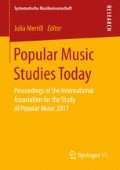Abstract
Research in music from the perspective of musicology has in listening its main tool for knowledge production. When the object of research is the music of the past, we are talking about a chain of successive receptions to which the musicologist needs to exert some “historical imagination” (Treitler 1989), that is, to explore the signs of “presentification” - music is always listened to in the present – recorded in (usually written) documents they have access to. Additionally, successive receptions mean also a chain of listening practices or “audile technique” (Sterne 2003) that historically mediated what is music or noise. My hypothesis is that new listenings can be made by an “acoustically tuned” (Ochoa Gautier 2014) investigation, not only of canonized historical narratives, but also by revisiting primary sources. The case study is entertainment related musical practices recorded in Rio de Janeiro nineteenth century newspapers, especially after Brazilian proclamation of independence from Portugal. Preliminary results show the imperial capital as a cosmopolitan city, consuming a wide variety of music, among them waltzes and exotic dances such as the Spanish Cachucha. The transmission/reception of the later will be the focus of the presentation.
Access this chapter
Tax calculation will be finalised at checkout
Purchases are for personal use only
Preview
Unable to display preview. Download preview PDF.
References
Bibliography
Costa Lima Neto, Luiz de França. Forthcoming Feb. 2017. Music, Theater, and Society in the Comedies of Luiz Carlos Martins Penna (1833-1846) - Amidst the Lundu, The Aria, and the Alleluia. Lexington Books.
Costa-Lima Neto, L. 2014. Música, teatro e sociedade nas comédias de Luiz Carlos Martins Penna (1833-1846): entre o lundu, a ária e a aleluia. Tese (Doutorado em Música) – Universidade Federal do Estado do Rio de Janeiro, Rio de Janeiro.
Ginzburg, Carlo. 1989. Sinais: raízes de um paradigma indiciário. In: Ginzburg, Carlo. Mitos, emblemas, sinais: morfologia e história. São Paulo: Companhia das Letras, 1989. p. 143-179.
Kassabian, A. & Garcia, M. 2013. Ubiquitous Musics: the everyday sounds that we don’t Always notice. Surrey: Ashgate.
Ochoa Gautier, A. M. 2014. Aurality: Listening and knowledge in nine-teenth-century Colombia. Durham and London: Duke University Press.
Rice, T. 2016 Transmission. In: Grove Music Online. Oxford Music Online. Oxford University Press. http://www.oxfordmusiconline.com/subscriber/article/grove/music/46823.
Sterne, J. 2003. The Audible Past: Cultural Origins of Sound Reproduction. Durham, NC: Duke University Press.
Treitler, Leo. 1989. Music and the Historical Imagination. Cambridge, Mass.; London, England: Harvard University Press.
Ulhôa, M. T. & Costa-Lima Neto, L. 2013. Memory, History and Cultural Encounters in the Atlantic: the Case of Lundu. The World of Music (Wilhelmshaven), v. 2, p. 47-72.
Ulhôa, M. T. & Costa-Lima Neto, L. 2015. Cosmoramas, lundus e caxuxas no Rio de Janeiro, 1821-1850. Revista Brasileira de Música, 28, 33-61. Retrieved from http://rbm.musica.ufrj.br/edicoes/rbm28-1/rbm28-1-02.pdf.
Ulhôa, M. T. 2011. Lundu e prosódia musical: caminhos de pesquisa. In Música e História no Longo Século XIX, ed. by Herculano Lopes et al. Rio de Janeiro: Fundação Casa de Rui Barbosa, 69–95.
Scores and manuscripts
Carusi, S. (1830s). La cachucha: as danced by Madlle. Elssler / arranged for the guitar by Saml. Carusi. Baltimore: Published by the author, [be-tween 1830 and 1849]. Source: Harry Ransom Center Book Collection, University of Texas at Austin Libraries.
Cachucha: chanson et danse américaines… (1813?). In: Deuxième collection d’airs espagnols avec accompment de piano et guitare: cette collection est composée de vingt morceaux dans un seul cahier par Mr. Narcisse Paz. Partitura. Paris [s.n.] 1813?. Source: Biblioteca Digital Hispá-nica. Retrieved from http://bdh.bne.es/
Carnicer, R. (1810-1855). [Cachucha (Manuscrito original)], 1 partitura ([6] p.); 22 x 32 cm, Colección Guelbenzu 852. 40 M-BN BNMADRID SA-LA_BARBI M. GUELBENZU/1492. Source: Biblioteca Digital Hispánica. Retrieved from http://bdh.bne.es/
Regalo lírico: colección de boleras… (1831?). Paris (Boulevard des Itali-ens, 11): Paccini. Source: Biblioteca Digital Hispánica – 899 Mc/4824/3 dig78dig. Retrieved from http://bdh.bne.es/
Author information
Authors and Affiliations
Corresponding author
Editor information
Editors and Affiliations
Rights and permissions
Copyright information
© 2017 Springer Fachmedien Wiesbaden GmbH
About this chapter
Cite this chapter
Ulhôa, M. (2017). Musicology of Listening – New Ways to Hear and Understand the Musical Past. In: Merrill, J. (eds) Popular Music Studies Today. Systematische Musikwissenschaft . Springer VS, Wiesbaden. https://doi.org/10.1007/978-3-658-17740-9_30
Download citation
DOI: https://doi.org/10.1007/978-3-658-17740-9_30
Published:
Publisher Name: Springer VS, Wiesbaden
Print ISBN: 978-3-658-17739-3
Online ISBN: 978-3-658-17740-9
eBook Packages: Literature, Cultural and Media StudiesLiterature, Cultural and Media Studies (R0)

